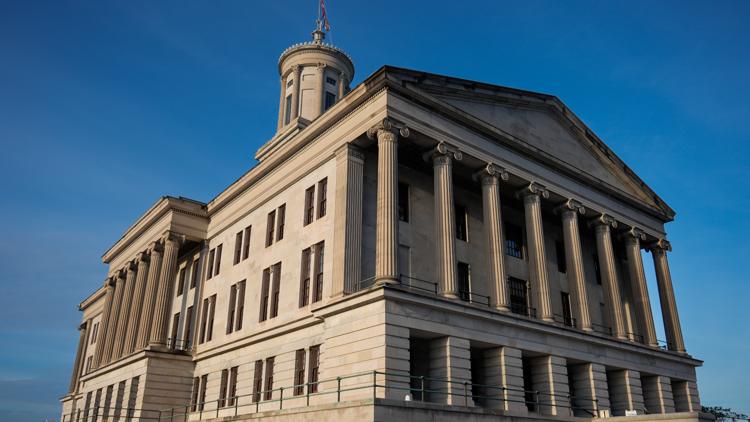NASHVILLE, Tenn. — Tennessee Gov. Bill Lee's universal school voucher proposal won't be passed by the legislature this year, he confirmed in a statement Monday morning.
You can read Lee's full statement below.
“I am extremely disappointed for the families who will have to wait yet another year for the freedom to choose the right education for their child, especially when there is broad agreement that now is the time to bring universal school choice to Tennessee. While we made tremendous progress, unfortunately it has become clear that there is not a pathway for the bill during this legislative session.
I want to thank the thousands of parents and students who made their voices heard, and I have never been more motivated to provide them with the ability to choose what’s best for their family. I also want to thank the speakers and leaders of both chambers for their commitment to pursuing education freedom next year.
It’s very simple — this is about every Tennessee student having the opportunity to succeed, regardless of their zip code or income level, and without question, empowering parents is the best way to make sure that happens."
This comes as members of the House, the Senate and Tennessee Governor Bill Lee filed separate universal school voucher bills in February. The Senate and the House debated the legislation last week and struggled to agree.
The divisions in the legislation proposed for the school voucher proposal and the franchise tax amount to hundreds of millions of dollars, according to the fiscal notes on both bills.
House Speaker Cameron Sexton (R - Crossville) said in an email to 10News last week that the bill would not advance in the House and Senate unless the sides agree on how to proceed.
Last year, a special session on public safety highlighted the deep divide between the House and the Senate. House members wanted to pass a slew of bills, while the Senate only wanted to pass three as well as a routine bill for funding.
Briggs, Faison and McNally insisted the House and the Senate have a good working relationship.
According to the National Education Association, the largest U.S. teachers union, 11 states have adopted universal school voucher laws. Supporters argue that doing so gives students in low-performing schools a way out and stress that vouchers give parents more control over what their children are taught. Critics counter that whether students who change schools with the use of taxpayer money achieve better educational outcomes is in dispute.
Monday's concession is also the latest policy loss for Lee, who over the years has struggled to wrangle the GOP legislative supermajority into supporting his top proposed initiatives. Last year, lawmakers ignored Lee's request to enact legislation that would keep firearms away from people who could harm themselves or others following a fatal Nashville school shooting. In 2021, the governor agreed to drop talks of expanding paid family leave for state workers after a hostile reaction from lawmakers. Lee has never vetoed a bill since taking office.
Lee first unveiled his plans last fall to allow families to access public money for private schooling, regardless of income. At the time, he was surrounded by the state's Republican legislative leaders and Arkansas GOP Gov. Sarah Huckabee Sanders, who had signed into law a voucher proposal just that year and used the event to tout that a conservative education revolution was happening around the country.
Yet despite the initial support, Lee's vision was always considered ambitious in a state where rural GOP lawmakers have remained skeptical of losing limited public school money in their own districts and local education officials have been loudly unanimous in their opposition to any hint of vouchers.
For months, Tennessee's GOP-dominant General Assembly has been deeply divided on the details surrounding how such a statewide plan would work. Differing versions advanced in the House and Senate, but those bills ultimately stalled as legislative leaders worked behind the scenes on a deal.
As of last week, the tone inside the Tennessee Capitol had noticeably shifted as lawmakers entered into the final weeks of session and hopes of a deal began to plummet. But no one would publicly declare the bill dead, instead saying that call had to come from Lee.
Lee has since promised to renew the school voucher talks next session, though it's unclear how that attempt will fare, as some members won't be returning next year because of retirement and others are facing opponents in this year's election.
Lee hinted that he will pursue candidates who support school vouchers in the GOP primary election in August.
“I’ve always been engaged in primaries in the state whenever there’s an election,” Lee said. “But I’ll certainly be talking to primary candidates about how they feel about school choice.”
Notably, both House and Senate budget writers still set aside $144 million for the voucher expansion in their spending proposals. That means that money will sit idly for nearly a year until school voucher talks can resume next January.
“Many initiatives need multiple years, or even multiple general assemblies, before they are ripe for passage," said Senate Speaker Randy McNally. "This is not an end, but a new beginning. Conversations will continue over the summer and fall, and we will revisit the issue next session with renewed purpose.”
House Speaker Cameron Sexton stressed that the General Assembly had come closer to an expanded school voucher agreement than in years past.
“We will continue working until all parents have the same opportunity to use their tax dollars to choose the best school for their child,” Sexton said in a statement.
Lee first asked lawmakers to consider expanding school vouchers back in 2019, when the plan was to allow parents of students in certain low-income districts with three or more schools ranked in the bottom 10% to receive $7,300 from a government-authorized account to pay for approved expenses.
After much editing, Republicans just barely passed a program that applied only to Democratic strongholds in Davidson and Shelby counties, which encompass Nashville and Memphis. Lee’s victory came as some GOP members received assurances that it would never apply to their own districts.
The Associated Press also contributed to this story.



